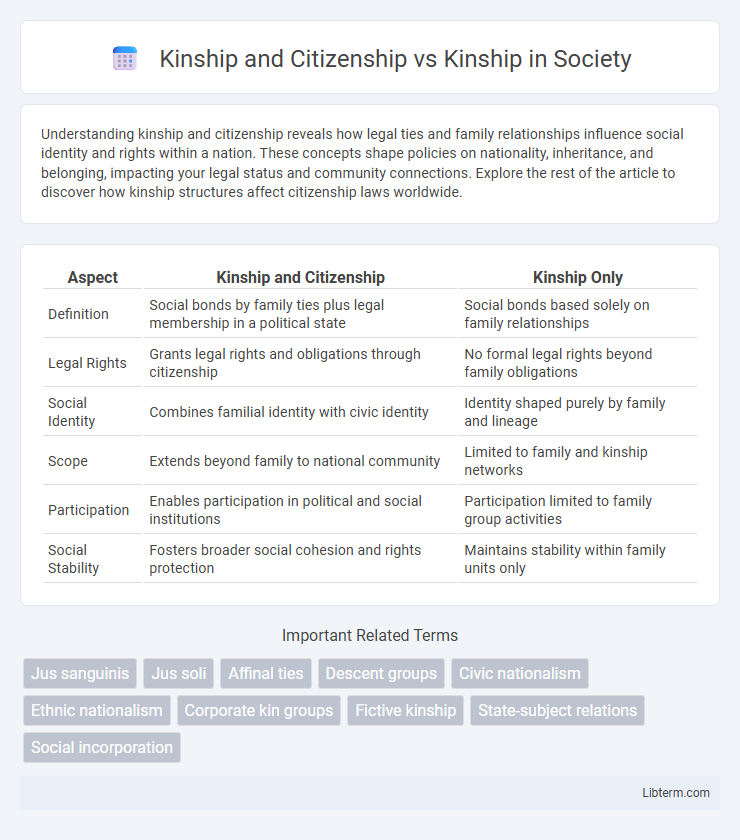Understanding kinship and citizenship reveals how legal ties and family relationships influence social identity and rights within a nation. These concepts shape policies on nationality, inheritance, and belonging, impacting your legal status and community connections. Explore the rest of the article to discover how kinship structures affect citizenship laws worldwide.
Table of Comparison
| Aspect | Kinship and Citizenship | Kinship Only |
|---|---|---|
| Definition | Social bonds by family ties plus legal membership in a political state | Social bonds based solely on family relationships |
| Legal Rights | Grants legal rights and obligations through citizenship | No formal legal rights beyond family obligations |
| Social Identity | Combines familial identity with civic identity | Identity shaped purely by family and lineage |
| Scope | Extends beyond family to national community | Limited to family and kinship networks |
| Participation | Enables participation in political and social institutions | Participation limited to family group activities |
| Social Stability | Fosters broader social cohesion and rights protection | Maintains stability within family units only |
Understanding Kinship: Definitions and Dimensions
Understanding kinship involves exploring social relationships based on blood, marriage, or adoption, which form the foundation of familial bonds and social structures. Citizenship, contrastingly, pertains to legal membership and rights within a political entity, emphasizing civic identity over biological or social ties. The interplay between kinship and citizenship highlights how identities are shaped by both inherited relationships and institutional affiliations.
The Evolution of Kinship Systems
Kinship systems have evolved from purely biological and social bonds to encompass legal and citizenship rights, reflecting complex identities beyond family ties. Traditional kinship structures emphasize blood relations and lineage, while citizenship incorporates legal recognition and civic responsibilities within a nation-state. This evolution highlights the intersection of social kinship with institutional frameworks, reshaping how communities define belonging and membership.
Citizenship: Concepts and Historical Development
Citizenship, a key legal status denoting membership within a political community, has evolved from ancient notions of kinship-based belonging to more formalized rights and responsibilities rooted in state sovereignty. The historical development of citizenship encompasses shifts from genealogical ties and clan affiliations toward civic identity defined by laws, constitutions, and social contracts, reflecting changes in governance and societal organization. Modern citizenship extends beyond family bonds to include political participation, legal protection, and civic duties, marking a distinct conceptual shift from traditional kinship structures.
Kinship vs Citizenship: Key Differences
Kinship and citizenship represent distinct concepts where kinship is based on biological or familial relationships, emphasizing lineage and social bonds, whereas citizenship is a legal status defining an individual's rights, duties, and membership within a state. Kinship structures influence social identity and community belonging, while citizenship determines political participation and access to state resources. Understanding these key differences highlights how kinship relates to personal affiliations, whereas citizenship governs one's formal relationship with a nation.
Social Bonds: From Family Ties to Civic Ties
Kinship and citizenship intertwine through the evolution of social bonds, extending from traditional family ties to broader civic connections that shape communal responsibility and identity. While kinship establishes fundamental social networks based on blood relations or marriage, citizenship expands these bonds into legal and political frameworks that promote collective participation and rights within a society. This transition underscores the dynamic nature of social cohesion, where personal relationships integrate with institutional roles to reinforce both belonging and civic engagement.
Intersection of Kinship and Citizenship in Modern Societies
The intersection of kinship and citizenship in modern societies reveals how legal status and familial bonds collectively shape individual identity and social belonging. Citizenship grants formal rights and responsibilities within a state, while kinship structures influence personal networks, cultural heritage, and social support systems. Understanding this interplay enhances policies addressing immigration, social integration, and community resilience.
The Role of Law in Defining Kinship and Citizenship
Law plays a critical role in defining kinship and citizenship by establishing legal frameworks that determine family relationships and national belonging. Citizenship laws govern rights, responsibilities, and identity within a state, while kinship is often legally recognized through statutes related to marriage, adoption, and inheritance. Legal definitions of kinship shape social and political inclusion, influencing access to benefits and recognition within citizenship frameworks.
Kinship, Citizenship, and Identity Formation
Kinship structures deeply influence identity formation by defining social roles, obligations, and belonging within familial and community networks, shaping an individual's sense of self and cultural heritage. Citizenship extends beyond legal status to encompass rights, duties, and social participation within a state, interacting with kinship ties to influence how identity is negotiated and expressed. The dynamic interplay between kinship and citizenship mediates identity formation by balancing inherited social bonds with civic responsibilities, creating complex layers of belonging and personal identity.
Cultural Impacts on Kinship and Citizenship
Cultural norms deeply influence the interplay between kinship and citizenship, shaping identity, social responsibilities, and legal recognition in diverse societies. Kinship systems often determine access to resources, rights, and community belonging, which citizenship laws may or may not acknowledge, creating gaps or integrations between personal relationships and state membership. Understanding these cultural impacts reveals how citizenship policies can either reinforce or challenge traditional kinship roles, affecting social cohesion and individual rights.
Future Trends: Redefining Social Belonging
Kinship and citizenship increasingly intersect, reshaping social belonging through legal, cultural, and technological frameworks that transcend traditional family ties. Future trends emphasize digital identities and global mobility, fostering inclusive kinship models that challenge state-centric citizenship paradigms. Emerging policies and technologies promote hybrid affiliations, reflecting evolving notions of community and belonging in a globalized world.
Kinship and Citizenship Infographic

 libterm.com
libterm.com